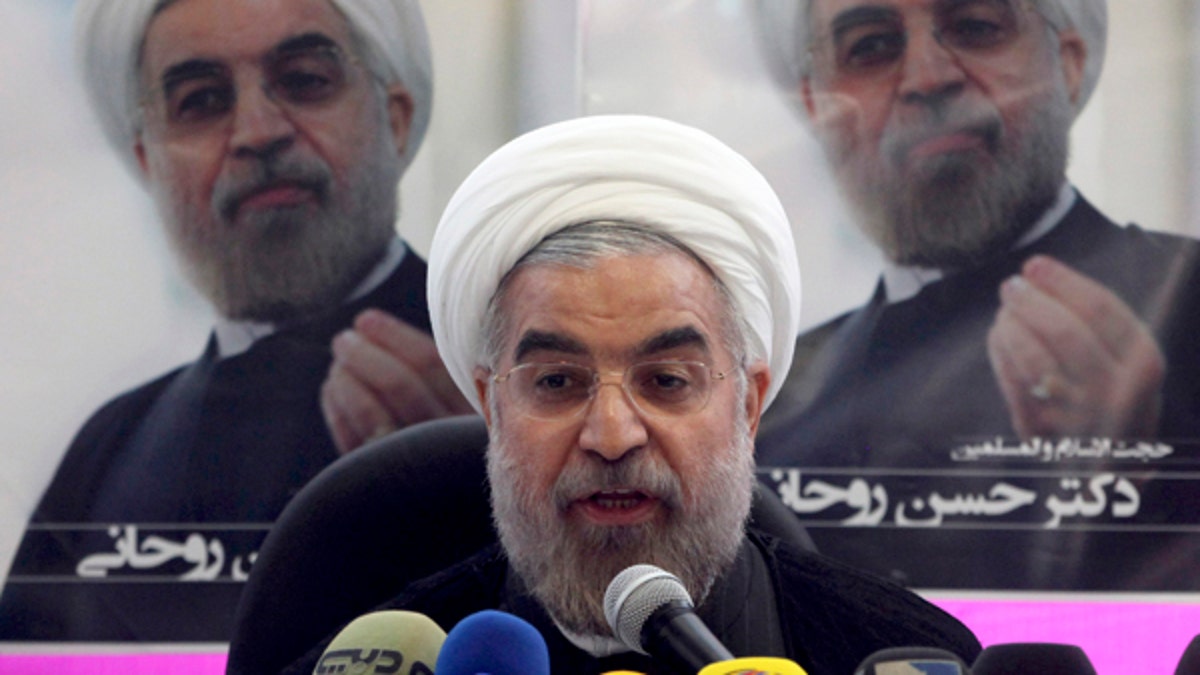
The cabinet assembled by new Iranian President Hasan Rowhani is made up of 18 mostly hard-liners. (AP Photo/Vahid Salemi)
Westerners hoping Iran’s new president will help lead Tehran in a more moderate direction won’t find much support in the cabinet Hasan Rowhani has assembled.
Rowhani’s 18-member, all-male, all-Shiite Muslim panel of close advisers includes hard-line holdovers, infamous former intelligence officers and one former justice minister known for ordering mass executions of political prisoners. The picks, which are likely to win the approval of the nation’s conservative parliament this week, belie Rowhani’s claims during the election that he would be more moderate than his predecessor, Mahmoud Ahmadinejad.
[pullquote]
"His cabinet reflects who he is,” said Mark Wallace, chief executive officer of United Against Nuclear Iran. “He is a savvy political operator who uses the balancing of a variety of different forces to maintain the status quo."
The most questionable appointment was Mostafa Pour Mohammadi, a veteran Tehran cleric and justice minister who served as Ahmadinejad’s interior minister. Pour Mohammadi is a former prosecutor of the Revolutionary Courts and deputy intelligence minister who became notorious for ordering wholesale mass executions of political prisoners.
One intriguing pick is foreign minister Mohammad Javad Zarif, an American-educated career diplomat and former ambassador to the United Nations who could emerge as a key in negotiations with the West over Iran’s rogue nuclear program. Zarif studied at the University of Denver and his children were born in the United States.
"Zarif was seen as the back channel for so many years here in the U.S. as ambassador and provided hope for so many American diplomats, but obviously that didn't work,” Wallace said. “The question becomes, will Zarif be any more empowered to make those changes now?"
Rowhani, 64, won the presidential election in Iran this past June to replace former rogue President Mahmoud Ahmadinejad, whose harsh public rhetoric increased tensions between Iran and the West. Immediately after his victory – but before selecting his cabinet -- Rowhani sought to signal a conciliatory tone toward the West.
"We are ready to engage in serious and substantial talks without wasting time," Rowhani said, but warned that Iran's interactions with the West should be based on "talks, not threats."
Experts on the region’s politics say they’ve seen the double-messaging before.
“The new Iranian government's composition does not reflect a significant change in Iran's commitment and deeds to finalize its nuclear program,” Yoram Meital, chairman of the Chaim Herzog Center for Middle East Studies and Diplomacy at Ben Gurion University told FoxNews.com.
Neither Rowhani nor his cabinet have any desire to change course, particularly when it comes to the country’s nuclear proliferation program, according to Meital.
The U.S. and its allies are mainly concerned about Iran’s ongoing nuclear weapons agenda, which Tehran denies is for military purposes. All political decisions in the country, including the nuclear issue, remain in the hands of Supreme Leader Ayatollah Ali Khamenei, leaving most to believe that Rowhani can do little differently than his successor and those in his cabinet.
Rowhani, however, campaigned as the only self-described moderate candidate and based the focus of his agenda on reviving Iran’s buckling economy by having the West lift heavy sanctions.
"I, as the president of Iran, announce that Iran has a serious political will to solve the (nuclear) problem while protecting the rights of the Iranian people at the same time as it seeks to remove concerns of the other party," Rowhani said last week.
Since his Aug. 4 inauguration, many blogs and websites have popped up calling on Rowhani to keep to his campaign promises.
